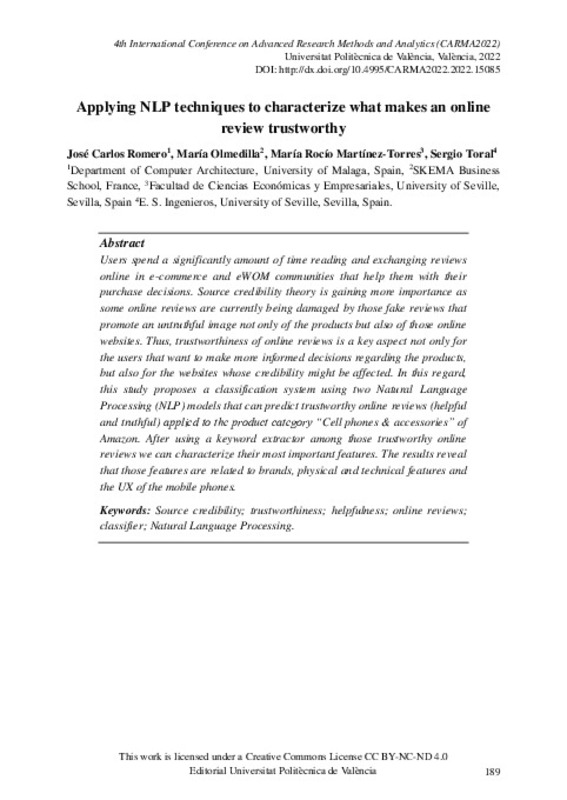JavaScript is disabled for your browser. Some features of this site may not work without it.
Buscar en RiuNet
Listar
Mi cuenta
Estadísticas
Ayuda RiuNet
Admin. UPV
Applying NLP techniques to characterize what makes an online review trustworthy
Mostrar el registro sencillo del ítem
Ficheros en el ítem
| dc.contributor.author | Romero, José Carlos
|
es_ES |
| dc.contributor.author | Olmedilla Fernández, María
|
es_ES |
| dc.contributor.author | Martínez-Torres, Rocío
|
es_ES |
| dc.contributor.author | Toral, Sergio
|
es_ES |
| dc.date.accessioned | 2022-11-10T13:40:19Z | |
| dc.date.available | 2022-11-10T13:40:19Z | |
| dc.date.issued | 2022-09-20 | |
| dc.identifier.isbn | 9788413960180 | |
| dc.identifier.uri | http://hdl.handle.net/10251/189580 | |
| dc.description.abstract | [EN] Users spend a significantly amount of time reading and exchanging reviews online in e‑commerce and eWOM communities that help them with their purchase decisions. Source credibility theory is gaining more importance as some online reviews are currently being damaged by those fake reviews that promote an untruthful image not only of the products but also of those online websites. Thus, trustworthiness of online reviews is a key aspect not only for the users that want to make more informed decisions regarding the products, but also for the websites whose credibility might be affected. In this regard, this study proposes a classification system using two Natural Language Processing (NLP) models that can predict trustworthy online reviews (helpful and truthful) applied to the product category “Cell phones & accessories” of Amazon. After using a keyword extractor among those trustworthy online reviews we can characterize their most important features. The results reveal that those features are related to brands, physical and technical features and the UX of the mobile phones. | es_ES |
| dc.description.sponsorship | This work was supported by Proyecto Aplicacion de Redes Generativas Antagonicas para Combatir la Manipulación de Clientes Online (REACT) Ref. PID2020-114527RB-I00 financiado por MCIN/ AEI /10.13039/501100011033 | es_ES |
| dc.format.extent | 7 | es_ES |
| dc.language | Inglés | es_ES |
| dc.publisher | Editorial Universitat Politècnica de València | es_ES |
| dc.relation.ispartof | 4th International Conference on Advanced Research Methods and Analytics (CARMA 2022) | |
| dc.rights | Reconocimiento - No comercial - Sin obra derivada (by-nc-nd) | es_ES |
| dc.subject | Source credibility | es_ES |
| dc.subject | Trustworthiness | es_ES |
| dc.subject | Helpfulness | es_ES |
| dc.subject | Online reviews | es_ES |
| dc.subject | Classifier | es_ES |
| dc.subject | Natural Language Processing | es_ES |
| dc.title | Applying NLP techniques to characterize what makes an online review trustworthy | es_ES |
| dc.type | Capítulo de libro | es_ES |
| dc.type | Comunicación en congreso | es_ES |
| dc.identifier.doi | 10.4995/CARMA2022.2022.15085 | |
| dc.relation.projectID | info:eu-repo/grantAgreement/AEI/Plan Estatal de Investigación Científica y Técnica y de Innovación 2017-2020/PID2020-114527RB-I00/ES/APLICACION DE REDES GENERATIVAS ANTAGONICAS PARA COMBATIR LA MANIPULACION DE CLIENTES ONLINE (REACT)/ | es_ES |
| dc.rights.accessRights | Abierto | es_ES |
| dc.description.bibliographicCitation | Romero, JC.; Olmedilla Fernández, M.; Martínez-Torres, R.; Toral, S. (2022). Applying NLP techniques to characterize what makes an online review trustworthy. En 4th International Conference on Advanced Research Methods and Analytics (CARMA 2022). Editorial Universitat Politècnica de València. 189-195. https://doi.org/10.4995/CARMA2022.2022.15085 | es_ES |
| dc.description.accrualMethod | OCS | es_ES |
| dc.relation.conferencename | CARMA 2022 - 4th International Conference on Advanced Research Methods and Analytics | es_ES |
| dc.relation.conferencedate | Junio 29-Julio 01, 2022 | es_ES |
| dc.relation.conferenceplace | Valencia, España | |
| dc.relation.publisherversion | http://ocs.editorial.upv.es/index.php/CARMA/CARMA2022/paper/view/15085 | es_ES |
| dc.description.upvformatpinicio | 189 | es_ES |
| dc.description.upvformatpfin | 195 | es_ES |
| dc.type.version | info:eu-repo/semantics/publishedVersion | es_ES |
| dc.relation.pasarela | OCS\15085 | es_ES |
| dc.contributor.funder | Agencia Estatal de Investigación | es_ES |








